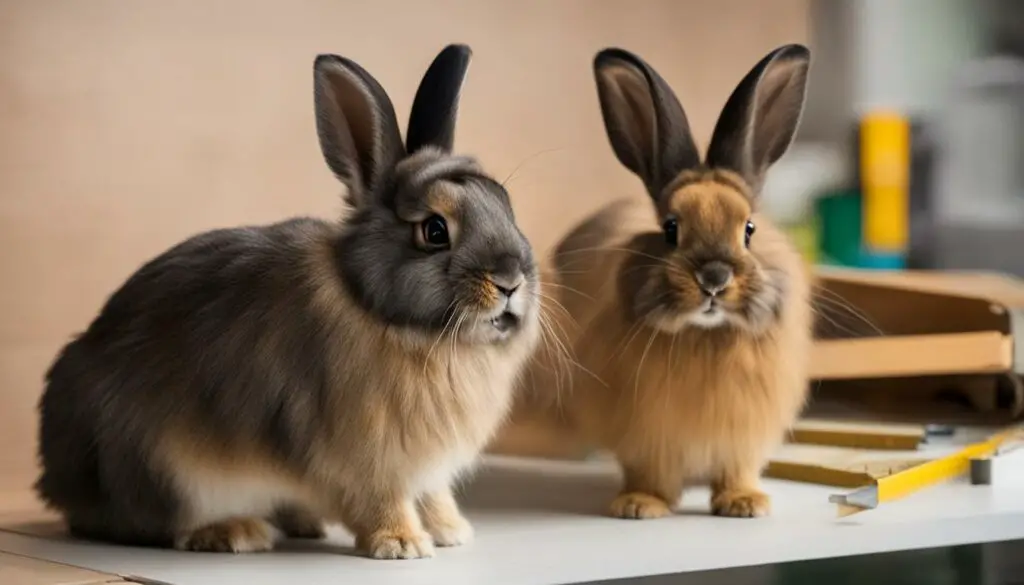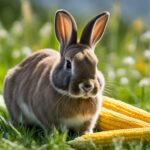Lionhead rabbits are known for their distinctive appearance, with a fluffy mane that gives them the appearance of a lion. Despite their name, Lionhead rabbits are actually one of the smaller breeds of rabbits. They typically grow to be around 8-10 inches long and weigh between 2.5-3.75 pounds. However, it’s important to note that these are just average sizes and individual rabbits may vary in size. The size of a Lionhead rabbit is determined by various factors including genetics, nutrition, and overall health.
- Key Takeaways:
- Lionhead rabbits are one of the smaller breeds of rabbits, typically growing to be around 8-10 inches long and weighing between 2.5-3.75 pounds.
- The size of a Lionhead rabbit can vary based on genetics, nutrition, and overall health.
- Individual Lionhead rabbits may be larger or smaller than the average size.
- Understanding the growth rate and size of Lionhead rabbits is important for their care and well-being.
- Proper nutrition and healthcare can contribute to the healthy growth of Lionhead rabbits.
In this comprehensive guide, we will explore the various aspects of Lionhead rabbits, including their size, growth rate, and care requirements. Whether you are considering getting a Lionhead rabbit as a pet or simply curious about this adorable breed, this guide will provide you with all the information you need to know.
What Is a Lionhead Rabbit?
A Lionhead rabbit is a breed of domestic rabbit known for its distinctive mane of fluffy fur around its head, resembling that of a lion. This unique appearance sets it apart from other rabbit breeds. Lionhead rabbits have a compact body, with an average length of 8-10 inches. They come in a variety of colors and patterns, adding to their visual appeal. Lionhead rabbits are also known for their friendly and docile nature, making them popular pets for many people. They are intelligent animals and can be trained to perform simple commands and tricks.
Characteristics of the Lionhead rabbit breed include their small size and adorable appearance. They have a relatively short body length compared to other rabbit breeds, and their most striking feature is the mane of fluffy fur that surrounds their head. This mane can vary in length and thickness depending on the individual rabbit. Lionhead rabbits also come in a wide range of colors and patterns, making each rabbit unique and visually appealing.
When considering a Lionhead rabbit as a pet, it’s important to understand their characteristics and needs. These rabbits require regular social interaction and should not be left alone for long periods of time. They thrive in environments where they can receive attention and affection from their owners. Lionhead rabbits also require proper nutrition, a suitable living space, and regular grooming to ensure their health and well-being.

Lionhead Rabbit Characteristics
“Lionhead rabbits are known for their friendly and docile nature, making them popular pets for many people. They are intelligent animals and can be trained to perform simple commands and tricks.”
| Characteristics | Description |
|---|---|
| Appearance | Lionhead rabbits have a distinctive mane of fluffy fur that surrounds their head, resembling that of a lion. |
| Size | They have a compact body, with an average length of 8-10 inches. |
| Colors and Patterns | Lionhead rabbits come in a variety of colors and patterns, adding to their visual appeal. |
| Temperament | They are known for their friendly and docile nature, making them ideal pets for families and individuals. |
| Trainability | Lionhead rabbits are intelligent animals that can be trained to perform simple commands and tricks. |
Mane
The mane is one of the defining features of a Lionhead rabbit. It is a thick and fluffy fur that surrounds the rabbit’s head, resembling a lion’s mane. There are two types of mane in Lionhead rabbits: single mane and double mane. The type of mane a rabbit has is determined by its genetics. Double mane rabbits have two mane genes, resulting in a fuller and more prominent mane. Single mane rabbits have one mane gene and their mane is less pronounced. The difference between the two types of mane can be observed in newborn rabbits, as double mane rabbits have a V-shaped formation on their belly.
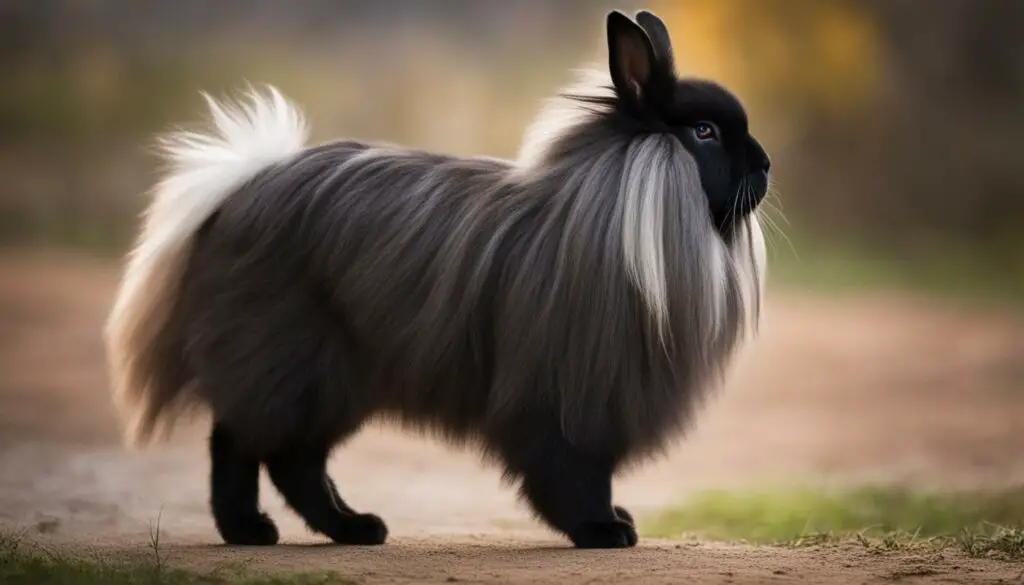
Table: Comparison of Single Mane and Double Mane Lionhead Rabbits
| Feature | Single Mane Lionhead | Double Mane Lionhead |
|---|---|---|
| Mane Appearance | Less pronounced | Fuller and more prominent |
| Inherited Traits | One mane gene | Two mane genes |
| Belly Formation | No V-shaped formation | Distinct V-shaped formation |
| Fur Thickness | Thinner | Thicker |
In general, both single mane and double mane Lionhead rabbits have beautiful and unique manes that add to their overall charm. Whether you prefer a more subtle or a more dramatic mane, both types can make wonderful companions and pets.
Lionhead Rabbit Coat Variations
Lionhead rabbits come in a wide range of colors and patterns, adding to their visual appeal and making each rabbit unique. Here are some of the different colors and coat variations that you might find in Lionhead rabbits:
Colors:
- Ruby Eyed White (REW)
- Tortoise (blue, black, chocolate, and lilac)
- Chocolate
- Blue Eyed White (BEW)
- Sable Point
- Seal
- Siamese Sable
- Frosted Pearl
These colors range from pure white to shades of brown, black, and gray. Each color brings a different look and charm to the breed.
In addition to the various colors, some Lionhead rabbits have coat variations that add even more diversity to their appearance. Some rabbits have dotted coats, where spots or speckles of a different color can be seen throughout their fur. Others may have darker colors at the tips of their nose and ears, creating a striking contrast.
The coat variations in Lionhead rabbits make them even more fascinating to observe and appreciate. With their unique colors and patterns, these rabbits are sure to catch the eye and bring joy to their owners.
Origin of The Lionhead Rabbit
The Lionhead rabbit is believed to have originated in Belgium and France. The breed was developed by crossing Netherland dwarf rabbits with the miniature Swiss Fox rabbit, resulting in a genetic mutation that led to the development of the characteristic lion’s mane fur. While the exact origins are disputed, breeders in these countries played a significant role in creating and refining the breed.
Lionhead rabbits were first recognized as a breed by the American Rabbit Breeders Association in 2013. Since then, they have gained popularity as pets and show rabbits due to their unique appearance and friendly nature.
The Lionhead rabbit’s origin story is a testament to the skill and dedication of breeders in their quest to create a miniature long-haired rabbit. The result is a breed that captures the charm and beauty of the lion, making them a beloved pet for many rabbit enthusiasts.

Table: Lionhead Rabbit Breeds by Origin
| Breed | Origin |
|---|---|
| Lionhead Rabbit | Belgium, France |
| Netherland Dwarf | Netherlands |
| Swiss Fox | Switzerland |
Personality of The Lionhead Rabbit
Lionhead rabbits have a delightful personality and temperament that make them wonderful companions. They are known for being friendly, gentle, and affectionate, which makes them great pets for families, individuals, and couples alike. These rabbits have a calm and docile nature, which makes them ideal for households with children. They are patient and tolerant, allowing children to handle them with care and learn about responsible pet ownership.
One of the remarkable traits of Lionhead rabbits is their intelligence. They are quick learners and can be trained to perform simple commands and tricks. This not only enriches their mental stimulation but also strengthens the bond between the rabbit and their owner. Lionhead rabbits enjoy social interaction and thrive on human companionship. They are sociable animals and love being a part of the family, whether it’s playing with their owners or simply being in the same room.
It’s important to note that Lionhead rabbits require regular human interaction and should not be left alone for extended periods of time. They appreciate attention and can become lonely and bored if neglected. Additionally, these rabbits have a curious nature and enjoy exploring their environment. Providing them with a stimulating and safe space to roam and play will help keep them happy and entertained.
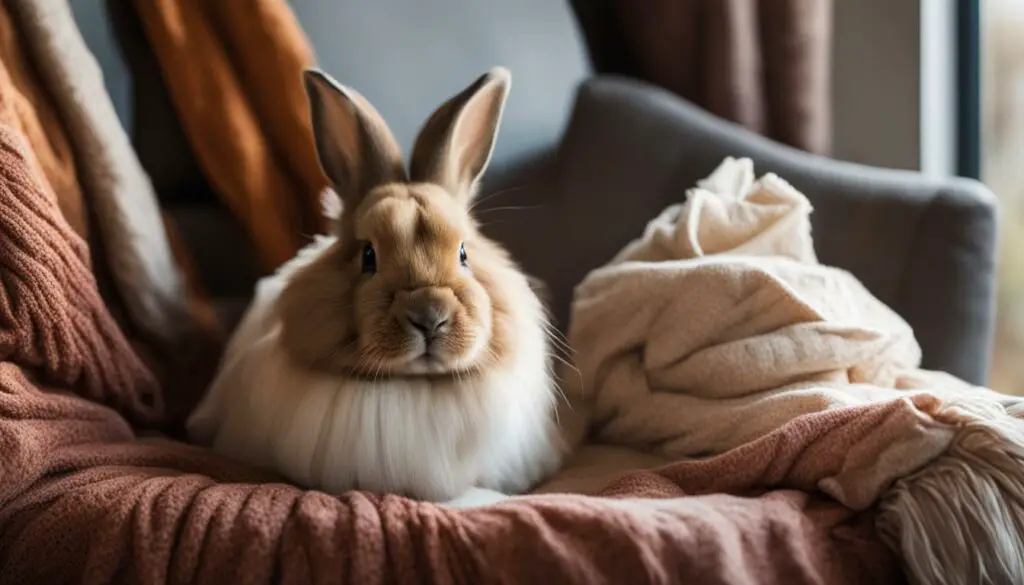
Table: Personality Traits of Lionhead Rabbits
| Trait | Description |
|---|---|
| Friendliness | Lionhead rabbits are friendly and enjoy human companionship. They are affectionate and love spending time with their owners. |
| Gentleness | These rabbits have a gentle nature and are patient, making them suitable pets for families with young children and individuals looking for a calm companion. |
| Intelligence | Lionhead rabbits are intelligent animals and can be trained to learn simple commands and tricks. They enjoy mental stimulation and learning new things. |
| Sociability | These rabbits are sociable creatures and enjoy the company of their owners and other animals. They thrive on social interaction and can form strong bonds with their human companions. |
| Curiosity | Lionhead rabbits have a curious nature and love exploring their environment. Providing them with a stimulating living space and opportunities for enrichment is important for their well-being. |
How Big Do They Get?
Lionhead rabbits are one of the smaller breeds of rabbits, typically growing to be around 8-10 inches long and weighing between 2.5-3.75 pounds. However, individual rabbits may vary in size due to factors such as genetics, nutrition, and overall health. It’s important to note that the maximum weight allowed for Lionheads used as show rabbits is 3.75 lbs according to the ARBA. The North American Lionhead Rabbit Club has slightly different rules, with an adult Lionhead not exceeding a weight of 3 pounds 12 ounces.
Proper nutrition plays a significant role in the growth rate of Lionhead rabbits. Providing a balanced diet with high-quality hay, fresh vegetables, and limited pellet intake is essential to support their overall health and development. Additionally, regular exercise and social interaction contribute to their well-being and can help maintain a healthy weight.
The size of Lionhead rabbits makes them suitable for various living arrangements, including apartment living. However, it’s crucial to provide them with a spacious and enriching living space that allows for exercise and exploration. This can be achieved through the use of a suitable enclosure with ample room for movement and play.
| Lionhead Rabbit Size | Average Length | Average Weight |
|---|---|---|
| Adult | 8-10 inches | 2.5-3.75 pounds |
| Show Rabbit Limit (ARBA) | N/A | 3.75 pounds |
| Show Rabbit Limit (NALRC) | N/A | 3 pounds 12 ounces |
Understanding the growth and size of Lionhead rabbits is crucial for providing them with the appropriate care and living environment. By considering their needs and providing proper nutrition and care, these unique and charming rabbits can thrive and bring joy to their owners.

Lionhead Breed as Show Rabbits
As a Lionhead rabbit owner, you may be interested in showcasing your furry friend in rabbit shows. Lionhead rabbits are recognized as a breed by the American Rabbit Breeders Association and have specific show standards that they must meet. These standards include requirements for weight limits, ear length restrictions, and color variations.
Show rabbits are carefully evaluated based on criteria such as body type, fur quality, color, and overall appearance. Participating in rabbit shows can be a rewarding experience for both you and your rabbit, as it allows you to showcase their unique qualities and beauty to a wider audience. It’s an opportunity to connect with other rabbit enthusiasts, gain valuable knowledge, and even win awards for your beloved Lionhead.
Showcasing the exquisite mane and charming personality of a Lionhead rabbit can be a delightful experience. Being a show rabbit involves proper grooming, maintaining their weight within the specified limits, and ensuring they are in optimal health. It’s important to familiarize yourself with the show standards and make sure your rabbit meets the necessary criteria before entering a competition. This may involve regular visits to a veterinarian, grooming sessions, and providing a balanced diet to keep your rabbit in top condition.
As you embark on your journey in the world of rabbit shows, remember to enjoy the experience and appreciate the unique qualities that make your Lionhead rabbit special. Whether they win awards or not, the bond between you and your rabbit is priceless, and their charming personality will always shine through.
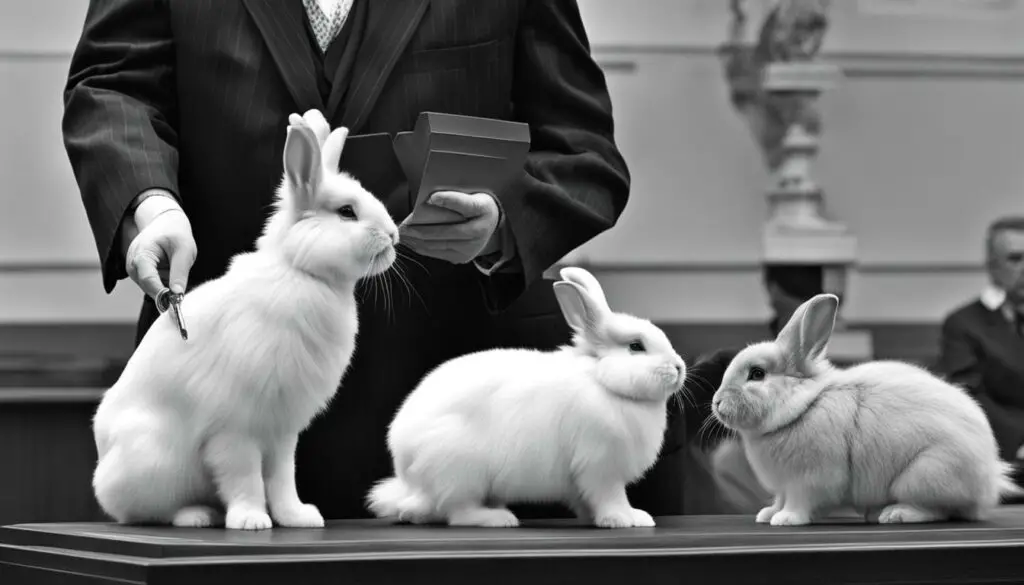
Who Is the Lionhead Rabbit Right For?
Lionhead rabbits make excellent pets for a variety of people. Their friendly and affectionate nature makes them ideal companions for families, including those with young children. They can also be a good choice for individuals or couples looking for a small and manageable pet. However, it’s important to consider the needs of Lionhead rabbits, as they require social interaction, a suitable living space, and regular grooming. Their small size and gentle temperament make them suitable for apartment living, but they should not be left alone for long periods of time.
Who Should Have a Lionhead Rabbit?
- Families: Lionhead rabbits are great pets for families with children. They are friendly and enjoy human interaction, making them perfect companions for kids. However, it’s important to supervise interactions between young children and rabbits to ensure the safety of both.
- Individuals or Couples: Lionhead rabbits are small and manageable, making them a good choice for individuals or couples looking for a pet that doesn’t require a lot of space. They can provide companionship and joy to individuals and couples who want a furry friend.
Suitability of Lionhead Rabbits as Pets
Lionhead rabbits have a gentle and docile nature, which makes them great pets for people of all ages. They are known for their friendly and affectionate behavior, and they enjoy human company. However, it’s important to note that Lionhead rabbits require regular social interaction and should not be left alone for long periods of time. They thrive in environments where they receive attention and love from their owners.
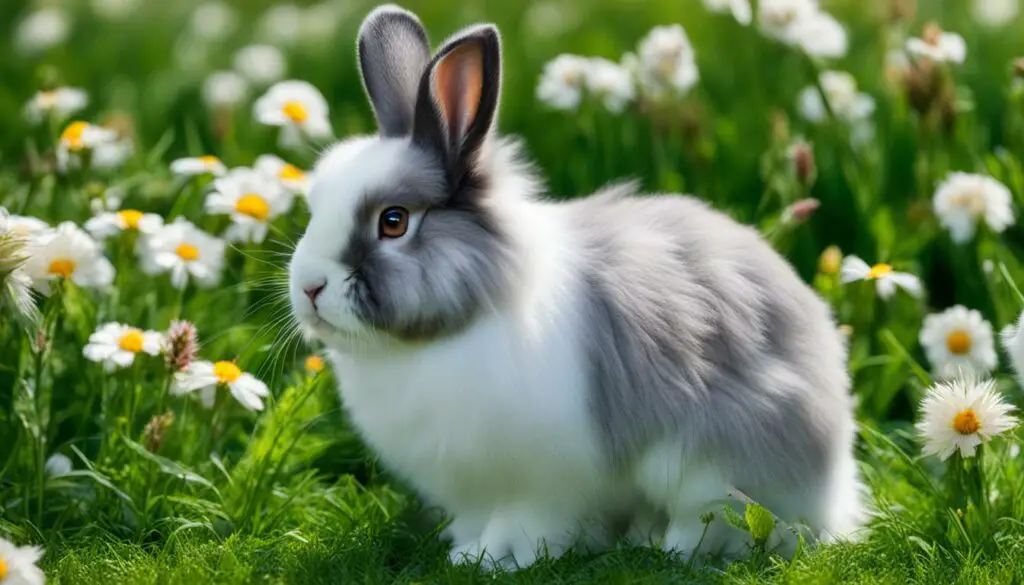
Living Space Requirements
| Living Space Requirement | Description |
|---|---|
| Minimum 12 square feet | Lionhead rabbits require a spacious living space to move around comfortably. A minimum of 12 square feet of space is recommended for their well-being. |
| Enclosed Sleeping Area | Lionhead rabbits need a designated enclosed area where they can rest and sleep undisturbed. This area should be cozy and comfortable. |
| Litter Box | Providing a litter box will help keep the living area clean and hygienic. Lionhead rabbits can be trained to use a litter box for their bathroom needs. |
| Exercise and Play Space | Lionhead rabbits need room to exercise and play. Include toys, tunnels, and other stimulating elements to keep them active and entertained. |
Care of Lionhead Rabbits
When it comes to caring for Lionhead rabbits, there are several important aspects to consider. These include providing a suitable living space, grooming their fur, meeting their dietary needs, and understanding the overall cost of owning one.
Lionhead rabbits require a spacious living environment to thrive and be happy. A minimum of 12 square feet of space is recommended, which should include an enclosed sleeping area, a litter box, and room for exercise and play. Whether you choose to house your rabbit indoors or outdoors, it’s essential to ensure their safety and well-being.
Grooming is another crucial aspect of caring for Lionhead rabbits. Their long and fluffy fur requires regular brushing to prevent matting and maintain its health. Weekly brushing is recommended, and more frequent brushing may be necessary during the molting season when their fur sheds and regrows. Additionally, regular nail maintenance is essential to prevent overgrowth and discomfort.
Feeding a balanced diet is vital for the overall health of Lionhead rabbits. Their diet should consist mainly of fresh hay, such as Timothy hay, which provides essential fiber for proper digestion. Fresh vegetables should also be included, offering a variety of options to ensure a well-rounded diet. Pellets can be given in limited quantities as a source of additional nutrients, but it’s important to monitor their weight and avoid overfeeding.
| Aspect of Care | Key Points |
|---|---|
| Living Space Requirements | A minimum of 12 square feet of space, with an enclosed sleeping area and room for exercise and play. |
| Grooming Needs | Regular brushing to prevent matting, nail trimming, and attention to fur maintenance during the molting season. |
| Feeding Requirements | A balanced diet of fresh hay, vegetables, and limited pellets, with a focus on monitoring weight and avoiding overfeeding. |
| Cost of Ownership | Expenses for food, grooming supplies, veterinary care, and other accessories should be considered when owning a Lionhead rabbit. |
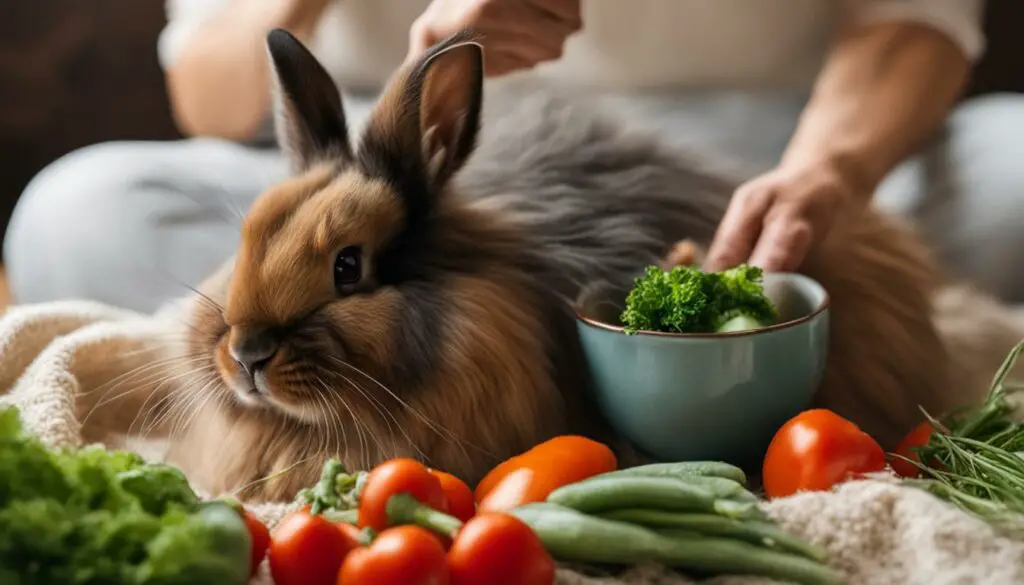
I’ve found that providing a suitable living space, regular grooming, proper nutrition, and considering the cost of owning a Lionhead rabbit are all important aspects of their care. These adorable and fluffy creatures bring joy to our lives, and taking care of them is a fulfilling responsibility.
By understanding and meeting the specific needs of Lionhead rabbits, we can ensure they live happy and healthy lives. From creating a safe and spacious environment to regular grooming and providing a balanced diet, our furry friends will thrive. So, if you’re considering getting a Lionhead rabbit as a pet, be prepared to give them the care and attention they deserve!
Living Space Requirements
When it comes to providing the ideal living space for your Lionhead rabbit, it’s important to ensure they have enough room to thrive and be happy. A minimum of 12 square feet of space is recommended, which should include a suitable enclosure with an enclosed sleeping area, a litter box, food and water bowls, and enough room for exercise and play.
You have the option of providing indoor or outdoor housing for your Lionhead rabbit, depending on your personal preference and the specific needs of the rabbit. Indoor housing can provide better temperature control and protection from predators, while outdoor housing can offer more opportunities for natural behaviors such as digging and foraging. Whichever option you choose, ensure that the living space is secure and provides adequate ventilation.
Natural light and fresh air are important for the well-being of your Lionhead rabbit, but it’s crucial to protect them from extreme temperatures, drafts, and direct sunlight. If housing your rabbit outdoors, provide a sheltered area that offers shade and protection from the elements. Regularly inspect the living space to ensure it remains clean, safe, and free from hazards that could harm your rabbit.

Table: Indoor vs Outdoor Housing for Lionhead Rabbits
| Indoor Housing | Outdoor Housing | |
|---|---|---|
| Temperature Control | Can be controlled and regulated for the comfort of your rabbit. | May require additional measures to protect your rabbit from extreme heat or cold. |
| Predator Protection | Offers a higher level of protection from potential predators. | Requires adequate fencing and shelter to protect your rabbit from predators. |
| Enrichment Opportunities | May require additional efforts to provide enrichment activities. | Allows for more opportunities for natural behaviors such as digging and foraging. |
| Space Limitations | May have more space limitations compared to outdoor housing. | Can provide a larger living space for your rabbit. |
It’s important to note that regardless of whether you choose indoor or outdoor housing, regular interaction and socialization with your Lionhead rabbit are essential. They thrive on companionship and will require daily attention and care from their human caregivers.
Grooming Needs
Grooming plays a crucial role in maintaining the health and appearance of a Lionhead rabbit. These adorable creatures have long fur that requires regular attention to prevent matting and keep their coat in top condition. By following a few simple grooming practices, you can ensure that your Lionhead rabbit stays healthy and happy.
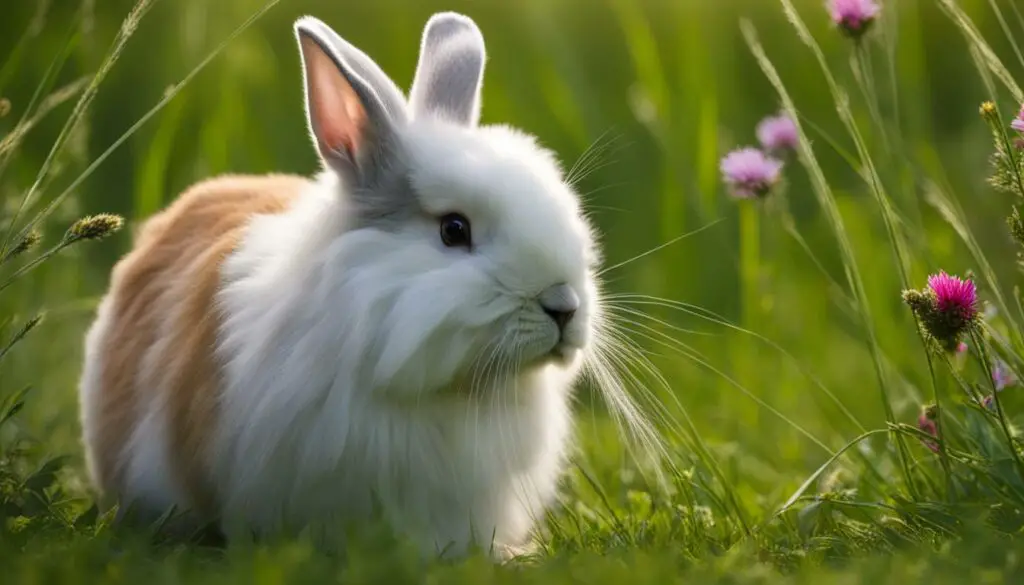
Brushing
Regular brushing is the key to managing the long fur of a Lionhead rabbit. Using a soft brush designed specifically for rabbits, gently brush their fur, paying special attention to areas prone to matting, such as the back of the neck and around the tail. Aim to brush your rabbit at least once a week, and increase the frequency during the molting season when they shed their fur. This helps remove loose hair and prevent the formation of mats.
Nail Trimming
Keeping your Lionhead rabbit’s nails trimmed is essential for their comfort and well-being. Use nail clippers designed specifically for rabbits, making sure they are sharp and clean. Take care not to cut the quick, which is the sensitive area containing blood vessels and nerves. If you are uncertain, it is best to trim small amounts at a time or seek the assistance of a veterinarian. Regular nail maintenance helps prevent overgrowth and ensures that your rabbit can move comfortably.
Fur Maintenance
In addition to brushing and nail trimming, Lionhead rabbits may require occasional fur maintenance. To keep their fur clean and healthy, you can gently wipe their coats with a damp cloth or use a rabbit-safe dry shampoo. Be sure to check their fur regularly for any signs of matting, fecal matter, or debris. If you notice any issues, gently remove the dirt or mat with your fingers or seek professional help if necessary.
Table: Grooming Checklist for Lionhead Rabbits
| Grooming Task | Frequency |
|---|---|
| Brushing | At least once a week, more during molting season |
| Nail Trimming | About once a month or as needed |
| Fur Maintenance | As needed, usually for spot cleaning |
How To Brush Your Lionhead Rabbit
Grooming is an important part of caring for your Lionhead rabbit and maintaining the health of their unique mane. Here are some techniques to help you brush your Lionhead rabbit:
- Start by gently holding your rabbit and create a calm and comfortable environment for the grooming session.
- Use a soft brush specifically designed for rabbits, ensuring that it is clean and free from any sharp or rough edges that might harm the rabbit’s delicate fur.
- Begin brushing from the head, moving in the direction of hair growth. Be gentle and avoid applying excessive pressure or tugging on the fur.
- Pay special attention to areas prone to matting, such as the back of the neck and around the tail. Use slow, careful strokes to detangle any knots or mats.
- Take breaks if your rabbit becomes stressed or anxious during the grooming process. It’s important to maintain a positive and calm experience for your rabbit.
Regular brushing will help prevent tangles and mats and keep your Lionhead rabbit’s fur clean and healthy. Remember to always approach grooming with patience and care, ensuring the comfort and well-being of your beloved pet.
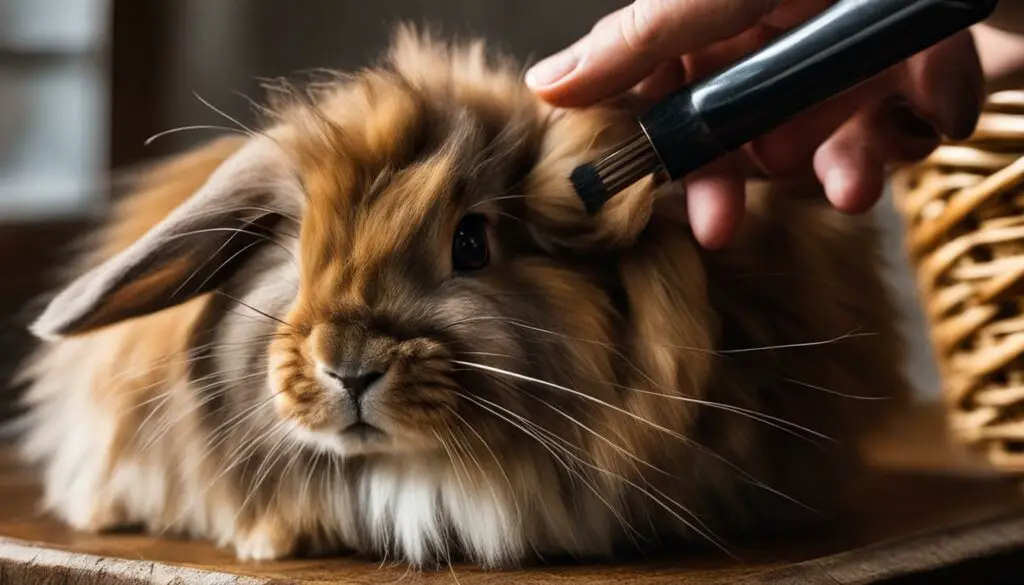
Lionhead Rabbit Nail Maintenance: How to Trim Your Rabbit’s Nails
Proper nail maintenance is crucial for the health and well-being of your Lionhead rabbit. Trimming their nails regularly not only prevents overgrowth but also ensures your rabbit remains comfortable and mobile. Here’s a step-by-step guide on how to trim your Lionhead rabbit’s nails:
- Prepare the tools: Gather a pair of sharp, clean nail clippers designed specifically for rabbits. Blunt or dirty clippers can cause discomfort or infection.
- Secure your rabbit: Hold your Lionhead rabbit securely, ensuring they are calm and relaxed. If needed, you can ask someone to assist in holding the rabbit while you trim their nails.
- Inspect the nails: Carefully examine each nail and identify the quick, which is the sensitive area containing blood vessels and nerves. Avoid cutting into the quick, as it can cause bleeding and pain.
- Trim the nails: Trim a small amount of the nail at a time, gradually working your way towards the desired length. Take breaks between each nail to give your rabbit a chance to relax.
- Use a gentle touch: Hold the rabbit’s paw firmly but gently, avoiding any sudden movements. Trim with a steady hand, ensuring a clean cut without crushing or splitting the nail.
“Trimming your Lionhead rabbit’s nails is an essential part of their regular grooming routine. It helps prevent their nails from becoming too long and causing discomfort or pain.”
Remember, if you’re unsure about trimming your rabbit’s nails or if your rabbit is particularly sensitive or resistant, it’s best to consult a veterinarian or a professional groomer. They can provide guidance and assistance, ensuring the process is as stress-free as possible for both you and your rabbit.
| Benefits of Nail Maintenance | Challenges of Nail Maintenance |
|---|---|
|
|
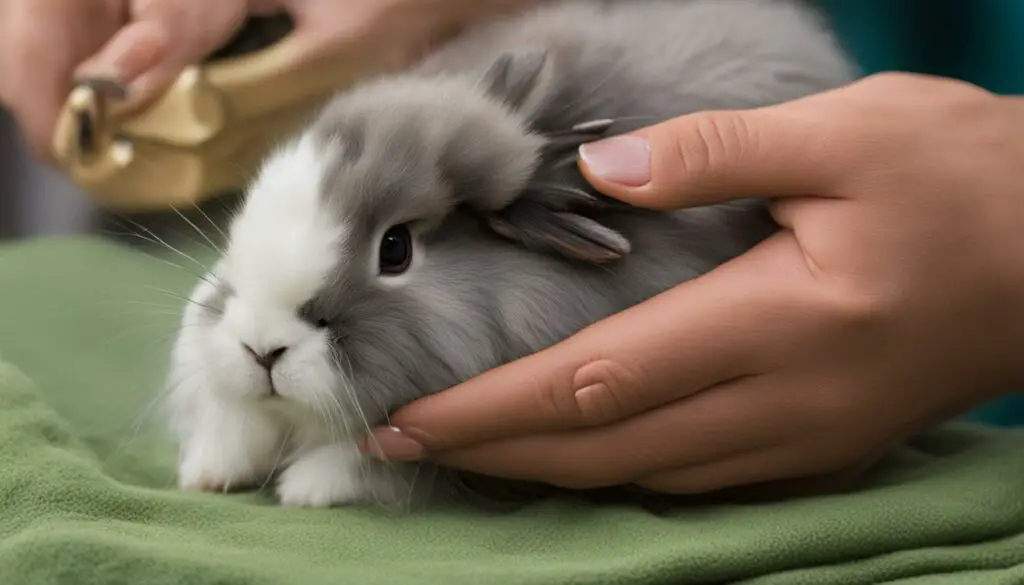
Regular nail maintenance is a crucial aspect of caring for your Lionhead rabbit. By following proper nail trimming techniques, you can ensure your rabbit’s nails remain at a healthy length, promoting their overall well-being and comfort.
Feeding Your Lionhead Rabbit
Proper nutrition is essential for keeping your Lionhead rabbit healthy and happy. The right diet will provide the necessary nutrients for growth, maintain a healthy weight, and support overall well-being. When it comes to feeding your Lionhead rabbit, there are a few key considerations to keep in mind.
Lionhead rabbits have specific dietary requirements that need to be met to ensure their optimal health. The foundation of their diet should consist of fresh hay, such as Timothy hay, which provides essential fiber for digestion. This should make up the majority of their daily food intake. Fresh vegetables are also an important part of their diet, offering a variety of nutrients and adding some variety to their meals. Leafy greens, such as romaine lettuce and spinach, are excellent choices. Additionally, you can offer them small portions of other vegetables like carrots and bell peppers. It’s important to introduce new foods gradually and monitor your rabbit for any signs of digestive issues.
While hay and vegetables are the main components of a Lionhead rabbit’s diet, you can also provide them with a small amount of pellets. Look for high-quality rabbit pellets that are specifically formulated for their nutritional needs. However, it’s important not to overfeed pellets as they can cause weight gain and other health issues. A general guideline is to offer approximately 1/4 cup of pellets per day, divided into two meals. Fresh water should always be available for your rabbit to drink, and make sure to clean the water bowl or bottle regularly.
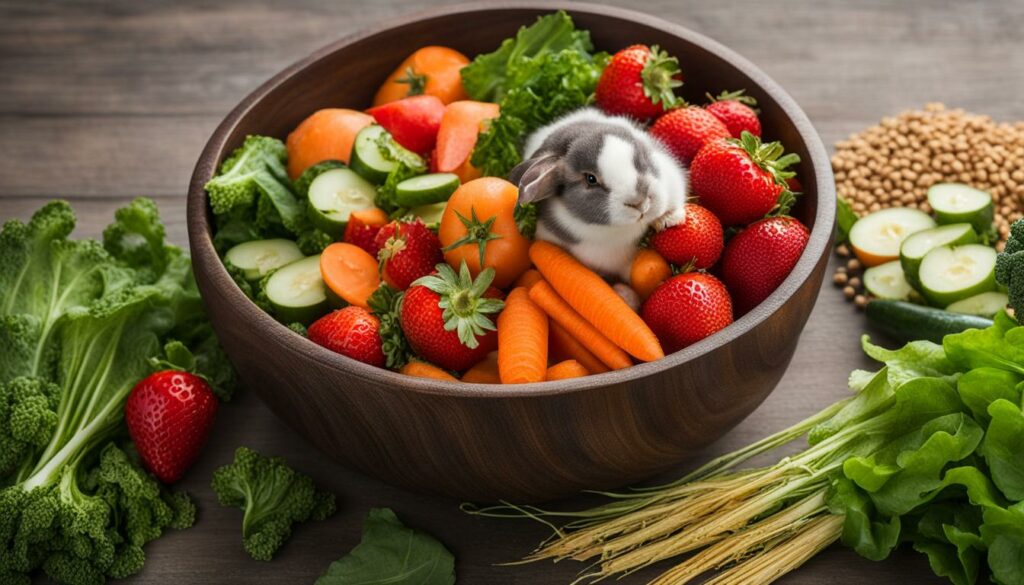
Feeding Schedule for Your Lionhead Rabbit
| Food | Quantity | Frequency |
|---|---|---|
| Hay | Unlimited | Ongoing |
| Fresh Vegetables | 1-2 cups | Daily |
| Pellets | 1/4 cup | Divided into two meals |
| Fresh Water | Always available | Ongoing |
It’s important to note that every rabbit is unique, and their dietary needs may vary. Monitor your rabbit’s weight and overall health regularly and make adjustments to their diet as needed. If you have any concerns or questions about your Lionhead rabbit’s diet, it’s always best to consult with a veterinarian who specializes in small animal care.
Conclusion
In conclusion, Lionhead rabbits are a delightful and enchanting breed that captures the hearts of rabbit lovers everywhere. With their striking appearance and gentle temperament, they make wonderful companions for individuals and families alike. Whether you’re seeking a small and manageable pet or a furry friend for your children, Lionhead rabbits are an excellent choice.
Understanding the unique characteristics of Lionhead rabbits, such as their size, growth rate, and care requirements, is essential for providing them with a happy and fulfilling life. From ensuring they have a suitable living space to regular grooming and a balanced diet, taking care of a Lionhead rabbit requires dedication and attention to detail.
By providing them with proper care, Lionhead rabbits can thrive and bring joy to their owners for many years to come. Their friendly nature and intelligence make them easy to train and interact with, resulting in a deeply rewarding relationship. So, if you’re looking for a furry companion that will light up your life, the Lionhead rabbit is an excellent choice.
In summary, Lionhead rabbits are small in size but big on personality. Their fluffy manes and affectionate demeanor make them a joy to be around. From their unique appearance to their friendly nature, Lionhead rabbits are truly one-of-a-kind. So, if you’re ready to welcome an adorable and loving companion into your home, consider adding a Lionhead rabbit to your family.
FAQ
How big do lionhead rabbits get?
Lionhead rabbits typically grow to be around 8-10 inches long.
What is a lionhead rabbit?
A lionhead rabbit is a breed of domestic rabbit known for its distinctive fluffy mane.
What types of mane do lionhead rabbits have?
Lionhead rabbits can have either a single mane or a double mane.
What are the color variations of lionhead rabbits?
Lionhead rabbits come in a wide range of colors, including Ruby Eyed White, Tortoise, Chocolate, and more.
Where do lionhead rabbits come from?
Lionhead rabbits are believed to have originated in Belgium and France.
What is the personality of a lionhead rabbit?
Lionhead rabbits are known for their friendly and docile nature.
How big do lionhead rabbits grow?
Lionhead rabbits typically grow to be around 8-10 inches long.
Can lionhead rabbits be shown in competitions?
Yes, lionhead rabbits can be shown in competitions and have specific show standards they must meet.
Who is the lionhead rabbit right for?
Lionhead rabbits make excellent pets for a variety of people, including families and individuals.
What are the care requirements for lionhead rabbits?
Lionhead rabbits require a suitable living space, regular grooming, and a balanced diet.
What are the living space requirements for lionhead rabbits?
Lionhead rabbits require a living space of at least 12 square feet.
How should I groom my lionhead rabbit?
Lionhead rabbits should be brushed at least once a week, with more frequent brushing during molting seasons.
How do I trim my lionhead rabbit’s nails?
Lionhead rabbit’s nails should be trimmed about once a month using specially designed nail clippers.
What should I feed my lionhead rabbit?
Lionhead rabbits should be fed a balanced diet consisting of hay, fresh vegetables, and a limited amount of pellets.

